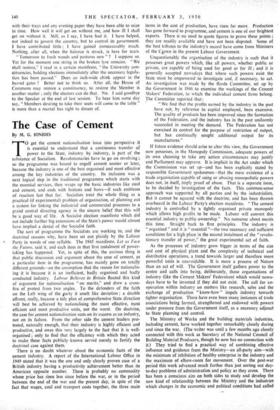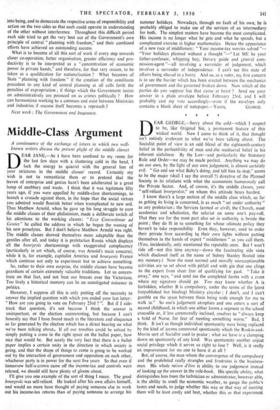The Case of Cement By M. G. IONIDES The sort
of programme the Socialists are working to, and the doctrinal reasons why, have been set out plainly by the Labour I, Party in words of one syllable. The 1945 manifesto, Let us Face the Future, said it, and each item in that first instalment of power- taking has happened. Yet, in spite of this, the curious thing is that public discussion and argument about the case of cement, as a particular item in the programme, has mainly gone on totally different grounds—on the assumption that the reason for nationalis- ing it is because it is an inefficient, badly organised and badly conducted industry. Labour Believes in Britain floated this kind of argument for nationalisation "on merits," and drew a cross- fire of protest from two angles. To the defenders of the faith on the Left wing of the party it smelt like deviation ; a double affront, really, because a tidy plan of comprehensive State direction will best be achieved by nationalising the most effective, most efficient and most productive units, not the worst. On doctrine, the case for cement nationalisation rests on its success as an industry, not on its failure. From the other side the cement leaders pro- tested, naturally enough, that their industry is highly efficient and productive, and owes this very largely to the fact that it is well- organised ; only to find that the efficiency with which they acted to make these facts publicly known served merely to fortify the doctrinal case against them.
There is no doubt whatever about the economic facts of the cement industry. A report of the International Labour Office in 1949 stated that it was the one and only clearly proven case of a British industry having a productivity achievement better than its American opposite number. There is probably no commodity whose price has risen less since before the war, or in the period between the end of the war and the present day, in spite of the fact that wages, coal and transport costs together, the three main items in the cost of production, have risen far more. Production has gone forward to programme, and cement is one of our brightest exports. There is no need to quote figures to prove these points ; they are readily available and have not been disputed. Some of the best tributes to the industry's record have come from Ministers of the Crown in the present Labour Government.
Unquestionably the organisation of the industry is such that it possesses great powers which, like all powers, whether public or private, are capable of being used for good or for ill ; and it is generally accepted nowadays that where such powers exist the State must be empowered to investigate and, if necessary, to act. An investigation was made by the fforde Committee, set up by the Government in 1946 to examine the workings of the Cement Makers' Federation, to which the individual cement firms belong. The Committee reported that: "We find that the profits earned by the industry in the past have not, by reference to capital employed, been excessive. The quality of products has been improved since the formation of the Federation, and the industry has in the past uniformly succeeded in meeting the demand. The Federation has not exercised its control for the purpose of restriction of output, but has continually sought additional output for its manufactures."
If future evidence should arise to alter this view, the Government now possesses, in the Monopoly Commission, adequate powers of its own choosing to take any action circumstances may justify and Parliament may approve. It is implicit in the Act under which the Commission was set up—and has been explicitly stated by responsible Government spokesmen—that the mere existence of a trade organisation capable of using or abusing monopolistic powers does not, in itself, imply proof of abuse. That is a separate issue, to be decided by investigation of the facts. This common-sense approach was supported by all parties and by the industrialists. But it cannot be squared with the doctrine, and has been thrown overboard in the Labour Party's election manifesto. "The cement industry is controlled by a tightly organised private monopoly which allows high profits to be made. Labour will convert this essential industry to public ownership." No nonsense about merits this time. Straight back to first principles. The industry is " organised " and it is "essential "—the two necessary and sufficient conditions for a high place in the second instalment of the "revolu- tionary transfer of power," the great experimental act of faith.
As the processes of industry grow bigger in terms of the size and cost of physical plant and the complexity of technical and distributive operations, a trend towards larger and therefore more powerful units is unavoidable. It is more a process of Nature than an act of will. The Government itself gathers power to the centre and calls into being, deliberately, those organisations of industry (like the Cement Makers' Federation) which would nowa- days have to be invented if they did not exist. The call for co- operation within industry on matters like research, sales and the exchange of production " know-how " impels industry, towards tighter organisation. There have even been many instances of trade associations being formed, strengthened and endowed with powers under pressure from the Government itself, as a necessary adjunct to State planning and control.
The Ministry of Works and the building materials industries, including cement, have worked together remarkably closely during and since the war. (The writer was until a few months ago closely connected with this work as Secretary of the National Council of Building Material Producers, though he now has no connection with it.) They tried to find a practical way of combining effective influence and guidance from the Ministry—an all-party aim—with the minimum of inhibition of healthy enterprise in the industry and the maximum of elbow-room for movement. Over the post-war period this work advanced much further than just sorting out day- to-day problems of administration and policy as they arose. There has been a conscious aim on both sides to study and develop the new kind of relationship between the Ministry and the industries which changes in the economic and political conditions had called into being, and to demarcate the respective areas of responsibility and action on the two sides so that each could operate in understanding of the other without interference. Throughout this difficult period each side tried to get the very best out of the Government's own principle of central "planning with freedom," and their combined efforts have achieved an outstanding success.
What is to become of all this sort of work if every step towards closer co-operation, better organisation, greater efficiency and pro- ductivity is to be interpreted as a "concentration of economic power in private hands," and therefore, for that very reason, to be taken as a qualification for nationalisation ? What becomes of State "planning with freedom" if the creation of the conditions precedent to any kind of central planning at all calls forth the penalties of expropriation ; if things which the Government insists on administratively are pounced on as crimes politically ? How can harmonious working to a common end exist between Ministries and industries if success itself becomes a reproach ?
Next week : The Government and Insurance.



































 Previous page
Previous page